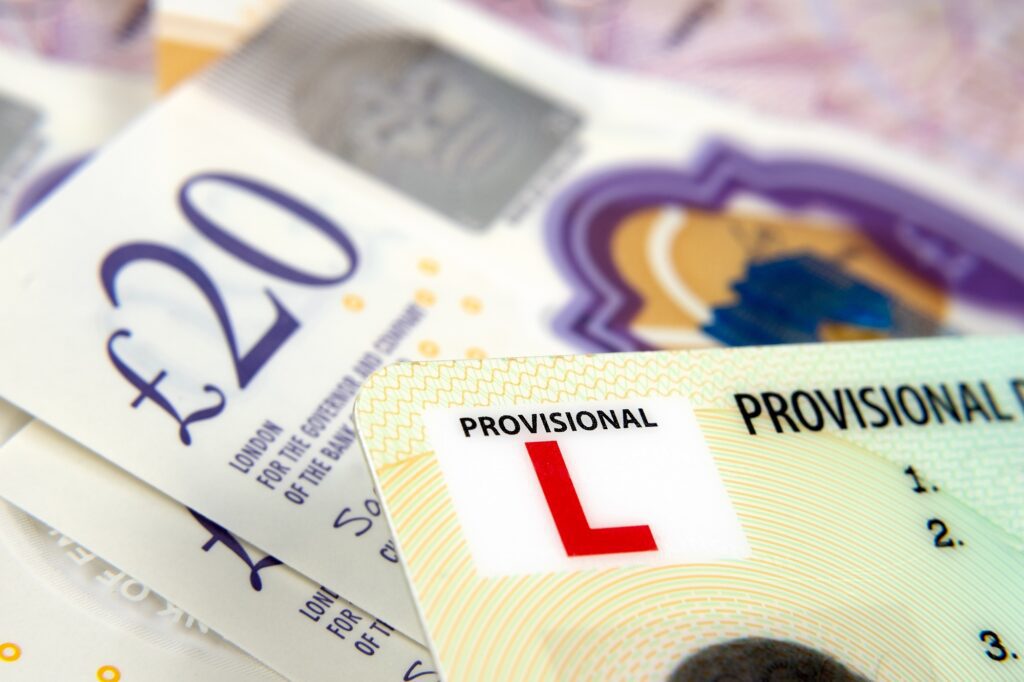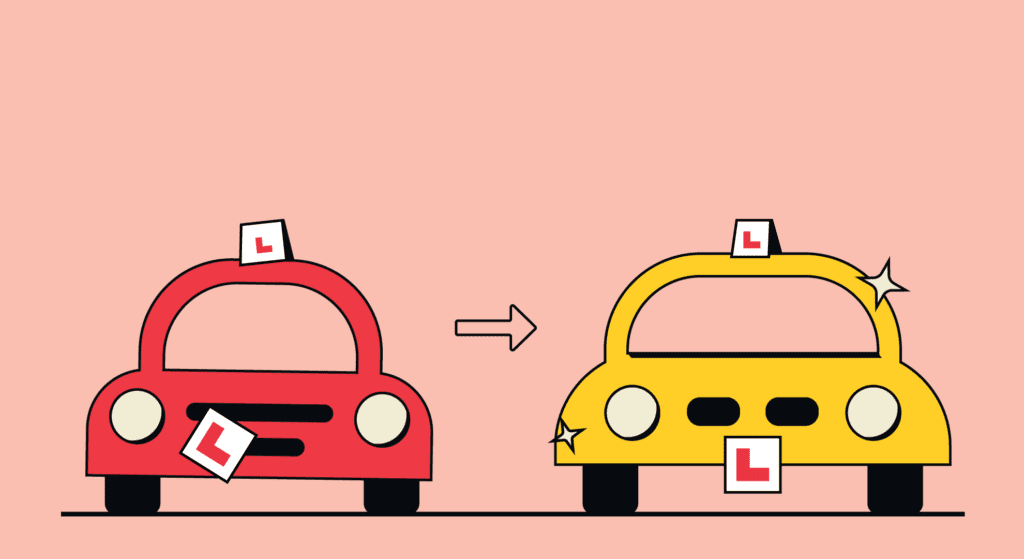Learning to drive is a rite of passage for many, but it can also sometimes be a very long or intense process. Everyone will pick up the required skills at a different pace and will need different levels of guidance and training. That’s why finding the right driving instructor for you is so important. You’ll spend a lot of time with your instructor – so if you don’t click with their training methods, it could have a major impact on your progress and learner driver confidence.
Smoothing out a challenging instructor-student relationship can often feel like it’s causing unwanted additional stress, which is the last thing you want when you’re learning to drive. That’s why we’ve created a list of the top signs that your instructor isn’t quite the right fit for you. Here’s what you should consider when evaluating your dynamic.
1. Are they making you stressed?
Driving nerves are one thing, but stress from your instructor is quite another. All instructors are different and a particularly loud or emphatic teacher can overwhelm some drivers, especially with the added pressures of the road. Your instructor may not realise if their enthusiasm is affecting your focus.
Remember, instructors have a responsibility to keep you at ease behind the wheel, offer support and help you learn the ways of the road in an effective, professional manner. It’s difficult to gain confidence and learn the skills you need if you’re overwhelmed or getting distracted by your instructor’s behaviour.
Politely ask your instructor to behave more calmly in the vehicle with you and be a little more patient. Of course, not everyone is able to easily change their communication style – it could be the case that other students respond well to a high-pressure approach. Ultimately, though, you need to do what’s right for you. If you don’t see enough of a change, it might be time to seek out an instructor with a calmer demeanour.
Should a driving instructor grab the wheel?
There are some instances where your instructor might take control of the wheel if you do something unpredictable. However, it is unusual for driving instructors to frequently grab the wheel – if your teacher keeps doing this, speak to them about it.
It is their responsibility to explain the objective of the lesson and give clear instructions and guidance throughout. They should also ask you regular questions and offer prompts. Doing so helps them understand what you are thinking and intending to do, reducing the likelihood of them needing to unexpectedly take control.
2. Do you feel you’re having to pay a lot?

Driving instructors and schools provide a valuable service, and it’s their right to decide how much they want to charge for it. Still, it’s natural as a learner to question whether you are getting the best possible value for money and paying a large sum can be daunting.
Problems can sometimes arise when a learner is ‘locked in’ to a large number of lessons in advance. Usually this is because of an attractive upfront rate that provides a handy discount. However, it can be frustrating to part with money in advance only for your instructor to arrive late or otherwise make inefficient use of time.
Of course, this doesn’t always happen. Just as often, such arrangements are a win-win: the learner saves money and the instructor benefits from being able to schedule further in advance. But it’s still worth being aware of the risk.
Research is your best friend. Checking online reviews can help you figure out whether an instructor’s teaching ability matches up to their price. It’s also worth remembering that low prices can be a false economy. If you aren’t taught properly at the beginning, you could end up spending more money relearning driving skills you thought you’d already mastered.
Find out how much driving lessons cost on average in our guide the costs of learning to drive.
3. Are you getting your money’s worth?
When paying up front, there is always the risk that you may not need all the lessons. You may quickly excel and end up feeling ready to take your test before your teaching time is up. Most instructors will refund you for the lessons you don’t require – having taught you
efficiently and saved you money – but this isn’t always the case. It’s a difficult situation: you might feel like you are being punished for your speedy progress.
The best solution is to check your instructor’s refund policy prior to handing over a large sum of money, especially if you feel you’re getting close to taking your test. If you’re not satisfied, you can either renegotiate with your instructor or – if they’re not comfortable changing their terms – opt for someone different.
4. Are you both making the most of your lesson time?

Most driving lessons only last one or two hours, so it’s natural to want to make the most of your time – after all, you’re paying for it. A good instructor should not only be punctual, they should also avoid ending lessons before the scheduled time.
Try to give your instructor the benefit of the doubt. If your lesson is cut short once, there’s probably a valid reason. However, if it keeps happening, you should consider politely raising the issue. Those minutes add up, and it’s only fair that you should get the time you were promised.
5. Do they get distracted by their mobile phone?
Instructors must be aware, alert and ready to intervene if necessary, so they shouldn’t allow themselves to be distracted by anything – especially a mobile phone or a call. Remember, it’s illegal for instructors to use their phones on the job, just as it is for the driver.
6. Does having a set mileage fit your lifestyle?
Lessons based on mileage tend to be rare, as there may be more or less opportunity to develop certain skills depending on your immediate surroundings. For example, if you live in a more rural area and your mileage is set per lesson, you may not have the opportunity to access different types of roads and situations, like busy junctions or dual carriageways.
While many instructors will ask you to be reasonable about location pick-ups and drop-offs, it’s best not to opt for lessons with a set mileage if this will hinder your learning experience.
7. Are they ensuring you learn from your mistakes?
Failing to pick up your errors can be detrimental to your learning experience as well as being dangerous. Receiving constructive criticism and feedback about your driving skills is an essential part of learning to drive.
Ensure you have an instructor who carefully observes your driving and communicates with you in a way that resonates. If you’re not registering the feedback they’re giving you, then you may struggle to pass your test, having made too many errors. You could also become a hazard on the road.
8. Do you spend more time talking than driving?

While it’s important to get plenty of experience behind the wheel, knowing the theory behind driving is also essential. You may find your initial lessons are mostly spent discussing the Highway Code, as your instructor prepares you for taking the wheel.
If you think you’ll benefit from more hands-on experience, whether that means driving for longer or practising manoeuvres rather than discussing them, talk to your instructor and let them know how you best learn.
9. Are you practising the skills you want to?
As your instructor is responsible for your education and safety, they may sometimes make decisions on your behalf and you won’t always agree. For example, you might want to practice parallel parking while they would prefer to see you drive on a dual carriageway. It’s key to remember that your instructor is drawing from a lot of experience – they may simply have noticed issues with your driving that you weren’t aware of.
However, your perspective as the learner is still invaluable. Be sure to communicate with your instructor and let them know which manoeuvres you’re finding challenging. It’s also good to ask for feedback on how they feel you’re doing – they might share an insight that explains the focuses of your recent lessons.
Remember: follow the rules
After considering your dynamic with your teacher and deciding whether they’re the right fit for you, it’s also important to remember the basic requirements of any instructor – knowing and following the rules.
That means displaying their Approved Driving Instructor (ADI) badge, checking your provisional licence and ensuring you are able to meet the minimum eyesight standard required to drive.
The colour of their ADI badge will show you whether they’re qualified (green) or still in training (pink), while reviewing your provisional will ensure you are eligible to drive the vehicle – and can prevent you both from getting in trouble with the authorities. Checking that a new driver can read (with glasses or contact lenses, if necessary) a car number plate from a distance of 20 metres (around five car lengths) is crucial for the safety of everyone in the vehicle.
If you cannot see your instructor’s ADI badge on their front windscreen, you can check if they’re registered on the DVSA website.
How to tell your driving instructor you want to change

If you feel like your driving instructor is not right for you, you should consider finding a new one. If you’re learning with a driving school, you can email or call the school directly and ask to change instructors. That way, you avoid having to confront the instructor if you don’t feel comfortable doing so.
If you are learning with an independent driving instructor, you will need to tell them that you will be changing driving instructors. Here are some tips to help guide your conversation:
- Remain polite and respectful when telling them you want to change.
- Tell them that you are going to change, rather than thinking of changing. This leaves little room for argument.
- Be honest and tell them some of the reasons why you want to change. You don’t need to give them all the reasons, just the ones you feel are necessary.
- Thank them for their time and effort.
If your instructor has shown signs of bad behaviour, such as anger or making you feel uncomfortable, you can contact the DVSA and report them.
You should start looking for a new instructor as early as possible before your test, ideally before you have a test booked, or at least four weeks in advance. This will give you enough time to get to know your instructor and, where relevant, their vehicle. It will also give your teacher time to adapt to your preferred way of learning and find out your driving strengths and weaknesses.
Don’t forget your learner driver insurance
Most learner drivers benefit from practising outside their formal lessons with a parent or a more experienced friend. This helps you practise what you’ve learned without having to pay for more time with your driving instructor. Just make sure that you tax and insure your vehicle beforehand.
Whether you’re learning to drive in your own car, or your parent’s or friend’s car, we offer comprehensive learner driver insurance policies to cover you for the short- or long-term. Our learner driver insurance policies can be taken out on a month-by-month basis so you only have to pay for the cover you need until you pass your driving test. Call us on 0800 369 8590 or book a callback for a quote.

